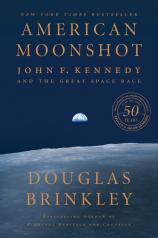American Moonshot: John F. Kennedy and the Great Space Race
Review
American Moonshot: John F. Kennedy and the Great Space Race
Fifty years ago, Apollo 11 astronauts accomplished what once seemed to be the impossible: the first lunar landing. The possibility of a lunar landing was even not a thought in the collective mind until President John F. Kennedy made his famous 1961 speech in the midst of the Cold War and ignited the Space Race.
In AMERICAN MOONSHOT, author and historian Douglas Brinkley both explores and creates a portrait of the men and women who made the Apollo mission possible, the groundbreaking science, and the looming cloud of the Cold War that had propelled JFK’s desire for this “impossible” dream. Though Brinkley tries to make it clear in the beginning that the book is more about a contribution “to U.S. presidential history (not space studies),” it is made obvious how many facts and lore surrounding the first three human spaceflight programs he has had to internalize and articulate in one volume.
"Space and Cold War enthusiasts alike will be delighted by this highly engaging resource into the political development of the program that ended in historic triumph rather than tragedy."
Brinkley’s underlying thesis becomes clear from the moment you start reading: the moon landing would have taken place much later if JFK hadn’t set a challenging goal for his administration. The fiscal conservatives’ reluctance (symbolized by President Eisenhower) to engage in the emerging military-industrial complex fueled his determination to make the mission succeed. With the Cold War in full swing, manned spaceflight to the moon was not only a rebuke of the Soviets, but “a fresh articulation of [America’s] national priorities.” In the years following JFK’s untimely death, Brinkley chronicles the efforts taken by NASA administrator James Webb and other political allies to keep the moon program a realized reality.
In an effort not to rehash the same tired facts surrounding the Mercury, Gemini and Apollo missions, Brinkley focuses his book on JFK’s efforts to understand the technology and engineering necessary for a lunar landing. There are still topics introduced that add a new dimension to and appreciation for the many unsung heroes --- for example, the Mercury 13, women who were tested physically and mentally to become astronauts. It is also interesting to see the connections to space flight that JFK had in his life leading up to his 1961 speech, and the efforts he made to understand the space program while touring NASA facilities and speaking with Wernher von Braun afterwards.
AMERICAN MOONSHOT does the service of explaining how the space program and America benefited from JFK’s dedication to the moonshot. Few have undertaken such an effort before, but Brinkley does a masterful job due to his extensive research and the weaving of American history that illuminates the fascinating characters about whom he speaks. It also paints us a vivid reminder of an America willing to accomplish a common and worthy goal. The continuous struggles that the Apollo mission faced is not discussed much here, perhaps to its benefit.
Space and Cold War enthusiasts alike will be delighted by this highly engaging resource into the political development of the program that ended in historic triumph rather than tragedy.
Reviewed by Gabriella Mayer on May 3, 2019
American Moonshot: John F. Kennedy and the Great Space Race
- Publication Date: April 14, 2020
- Genres: History, Nonfiction
- Paperback: 592 pages
- Publisher: Harper Perennial
- ISBN-10: 0062655078
- ISBN-13: 9780062655073




